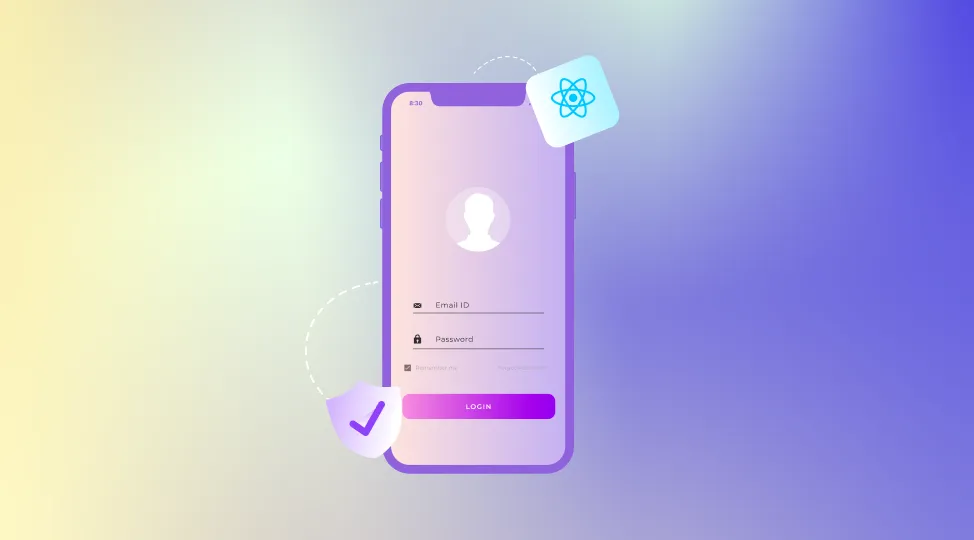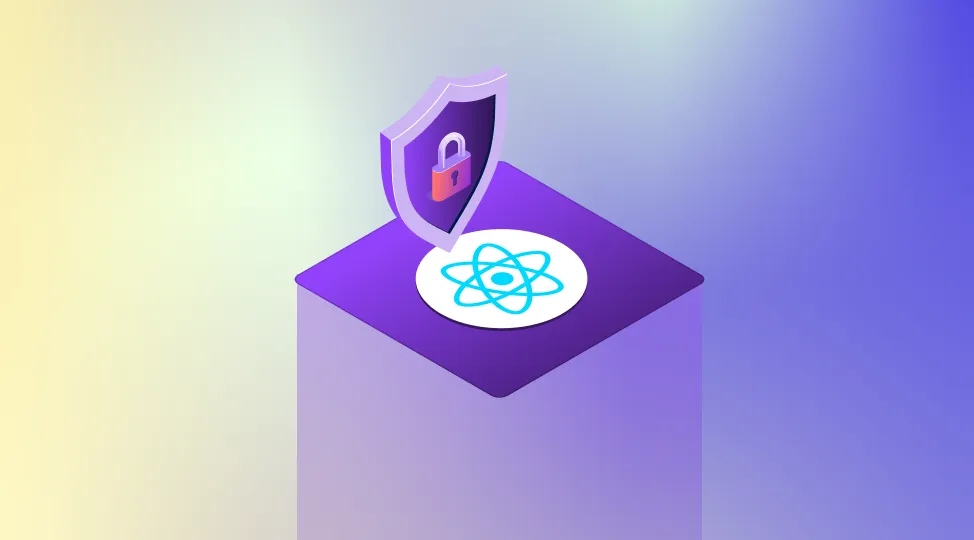Thanks to the new technology updates, it is currently conceivable to configure and design simple/complex projects. Now, we rarely need any help from experts to build a fantastic product. Building apps has become simpler than at any other time with the involvement of low-code or no-code platforms. Making complex applications without spending high costs or expert developers' help is easy.
Furthermore, you needn't bother to be a coding master to do such projects. Various low code no code platforms guarantee that you compose next to zero code and create excellent programming, sites, and apps.
No-code and low-code development platforms govern the coding
business/industry. As per Forrester's report, the worldwide low/no-
code business will develop to $30 billion by 2025.
This blog will provide a quick look at some of the best low-code and no-code platforms. Let's discuss what is Low code and No code in detail.
What is Low-Code or No-Code?
- Low code
Low code platforms permit a simple work process automation. It assists
with developing processes and gives various capabilities to non-specialized individuals/coders. The market is loaded with a few low-code or no-code platforms, offering false commitments, complex UIs, and costly service models.
Low Code is a visual representation of the software development process. Low Code mechanizes each step of the product development life cycle to convey solutions for various business needs.
- No-Code
No-Code focuses on residents/citizens, as individuals not ready to make
software frameworks. It is because of an absence of software improvement abilities.
No-Code is considered a 'citizen development,' employing individuals without prior knowledge. No-Code is helpful for primary clients confronting the front-end with pre-characterized database structures.
Low-code and No-code stages are becoming famous daily as they offer a quick option in contrast to traditional development processes. Furthermore, tech pioneers with no coding abilities and expert developers are using them to meet their business needs.
If you want to discover the rise of no-code/low-code app development, check out our blog on low & no-code app development benefits and challenges.
Advantages of Low Code No Code Platforms
- Higher efficiency
- Diminished cost
- Improved business agility
- Higher productivity
- Effective risk management
- Effective Governance
- Better user experience
- Quicker change
- Faster transformation
Explore Top 10+ Low Code No Code Platforms
- Visual Lansa
- Caspio
- Appian
- Zoho Creator
- Mendix
- Outsystem
- Quickbase
- Linx
- Creatio
- Bubble
1. Visual Lansa
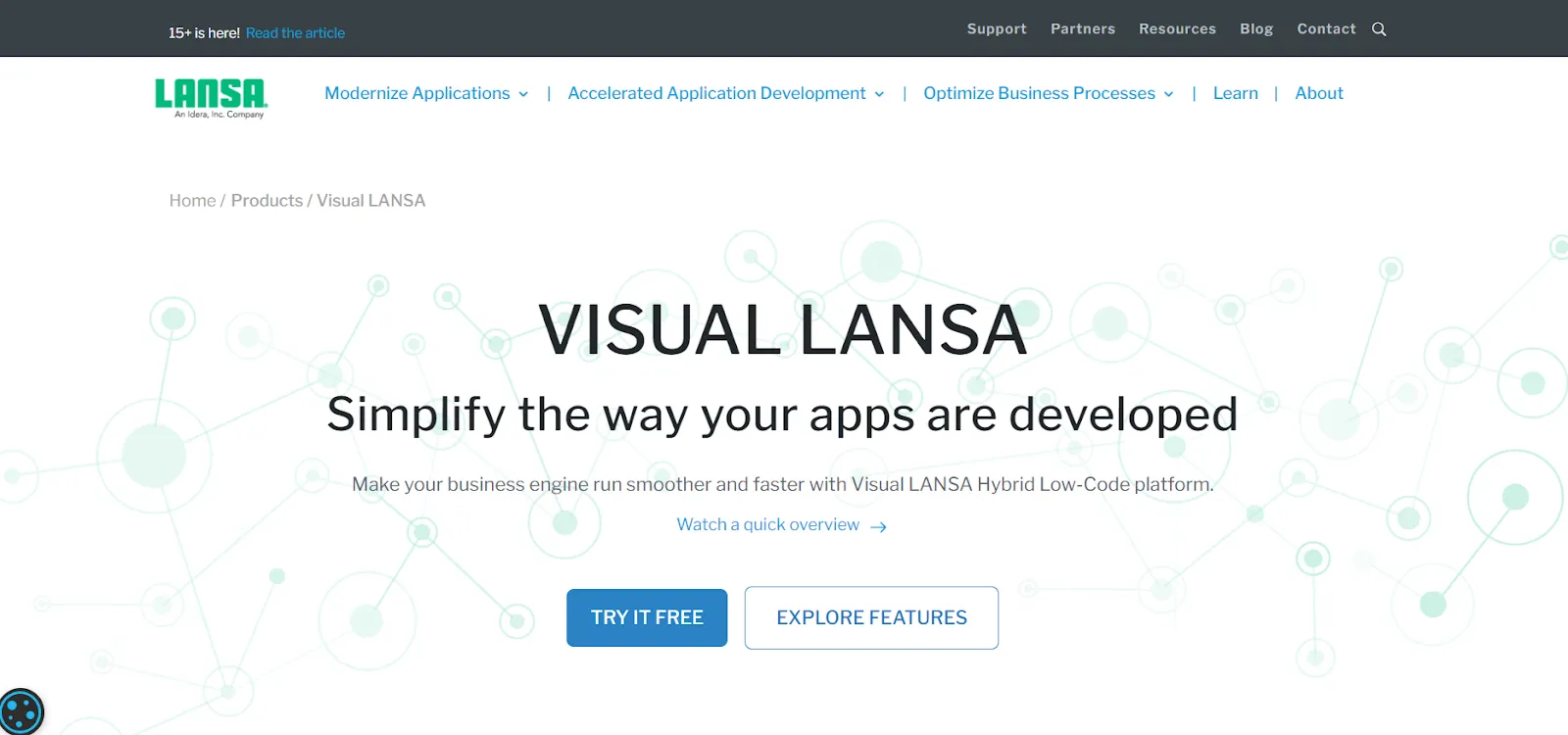
Visual LANSA is a low-code, Integrated Development Environment (IDE). It permits users/clients to construct apps on Windows OS, browsers, and cell phones for AWS and Azure cloud structures.
Features of Visual Lansa-
- A hybrid low-code IDE fosters web, desktop, and mobile applications
- A great UI to save time and cost
- Controls for comprehensive testing and integration
- It combines traditional coding and low-code in the same IDE
- This Permit to chip away at any piece of an application and increment yield without adding headcount or recruiting designers
- It can change your manual and paper-based processes into web, cloud, and desktop apps
- Take your applications to the cloud anytime for better readiness and flexibility
- It impacts every business area by conveying efficiency, control, and advancement
- Its repository stores the parts that are fundamental to application improvement
- It allows you to use the components and modules to reduce time and improve efficiency.
Platform: Cloud, IBM I, Windows
Price: Basic plan starts at $999.00 per month, and the Standard plan
starts at $4999.00 per month, Free Trial Available
2. Caspio
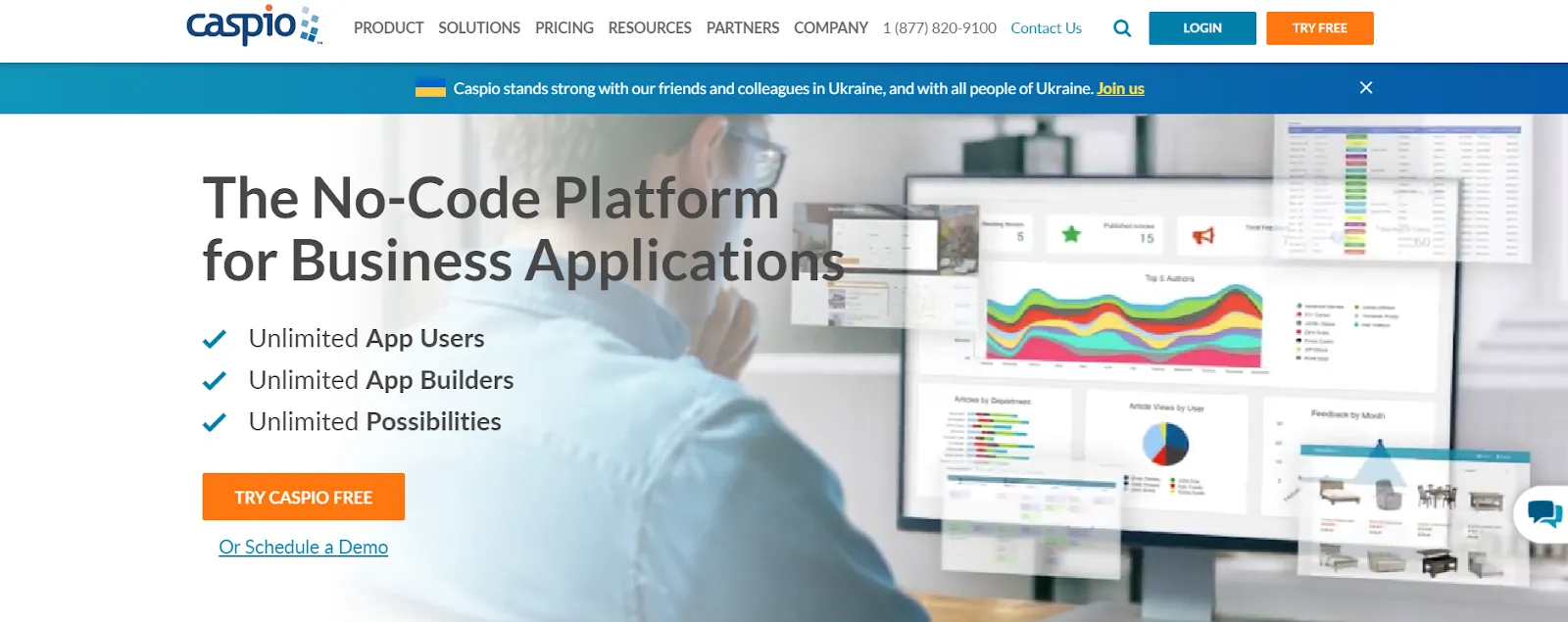
Caspio is one more fantastic choice for building cloud applications without coding. This development platform is appropriate for making versatile, reliable, and secure web applications.
Features of Caspio-
- It can assist you by arranging the database design, client/user permissions, and many more.
- Caspio's deployment model is perfect for both public and internal applications.
- It allows you to make an endless no. of online database applications in different use cases.
- It utilizes its tool for the visual improvement process. It configures cloud applications with structures, dashboards, and reports.
- This smooth point-and-click tool allows you to develop, create, and update your apps.
- It can modernize your applications with data representation using incorporating reports and schedules.
- You can also build area-based apps using Caspio's distance search, map joining, geocoding, etc.
- It utilizes encrypted password technology, record-level consents, IP-based admittance controls, single sign-on, and offers access logs, TLS information encryption, and review trails.
- It's consistent with HIPAA, FERPA, PCI DSS Level 1, and accessibility consistency like WCAG and ADA.
- Coordinate your application with services like AWS S3, Google Drive, and Zapier with 2k+ integration. You might alter the applications with REST API, CSS, HTML, SQL, and JavaScript.
- It runs on SQL Server and AWS to give the top-tier innovation stack for execution and security.
- Caspio's visual application manufacturer guides you in each part of building cloud-based applications.
Platform: Web Windows, Mac, Linux
Price : Explore plan: $128/year or $150 monthly; Build plan: $255/year
or $300 monthly, Free Trial Available
3. Appian
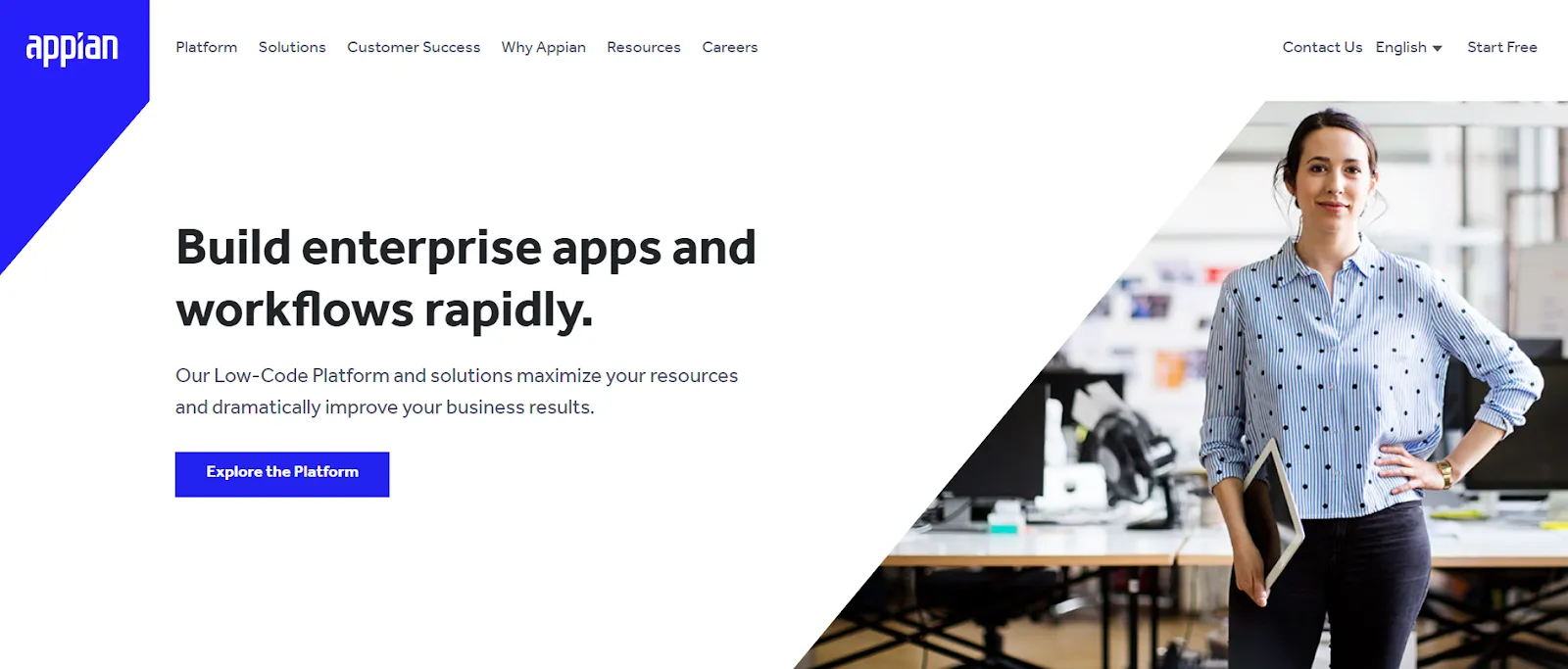
Appian is a low-code application that has a simple design to foster software. It assists you in automating your association's work. Appian permits clients to make business process management BPM applications for organizations.
BPM programming helps firms in arranging and streamlining business processes.
Features of Appian-
- Make it simple to use a UI(user interface)
- You can use one design across many stages, including Mac, PC, Android, and iOS.
- A low-code platform with native deployment tools and DevOps coordination prospects
- One of the mind-blowing low-code platforms with the expectation of complimentary. It empowers you to help business results utilizing AI (Artificial Intelligence)
- Appian Python's low code empowers you to plan your plan design
- No-code AI/ML platform coordination through Google Cloud, AWS, and Microsoft Azure
- It's capacity to coordinate venture data/information, frameworks, and web services.
Platform: Cloud, Windows, Mac, Linux UNIX, Solaris, etc.
Price: Basic Plan starts at $75.00 per feature per month. They do not have
a free version, Free Trial Available.
4. Zoho Creator
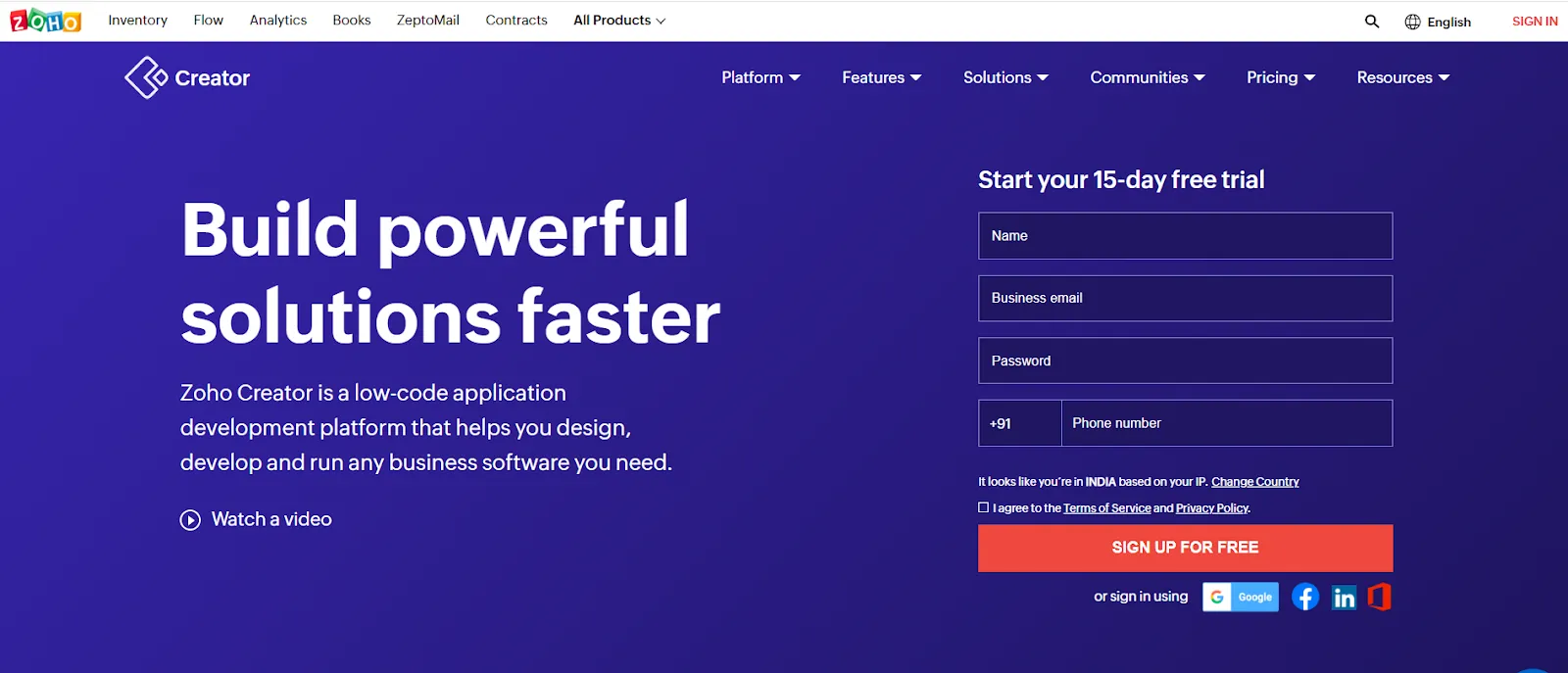
Zoho Creator is a tool that assists you in building software with no preparation and messy code. It empowers you to change over business rationale into a practical work process. This software gets coordinated with PayPal,
QuickBooks, and Zapier .
Features:
- Zoho Creator makes everything fast, simple, and secure.
- It is one of the best platforms that assist you with building apps broadening and incorporating their usefulness.
- This platform is adaptable and easy to understand, joining many functionalities with an engaging UI.
- It offers tweaked, custom-made arrangements so you can build the apps you conceptualized.
- You can construct multi-stage apps from moderate call logs to ERPs equipped to incorporate your ongoing cycles.
- Speed up your application improvement process with their automatic code editors, pre-formats, etc.
- You can arrange and mechanize work processes in your apps with primary cycles and steps.
- It permits customers to build applications by bringing records and distributed storage information. We can also use the build-in devices to alter the UI to their necessities.
Platform: Cloud,iOS, Android,PWA.
Price: Professional Plan: $25/user/month and Ultimate Plan: $400/month,
Free Trial Available
5. Mendix
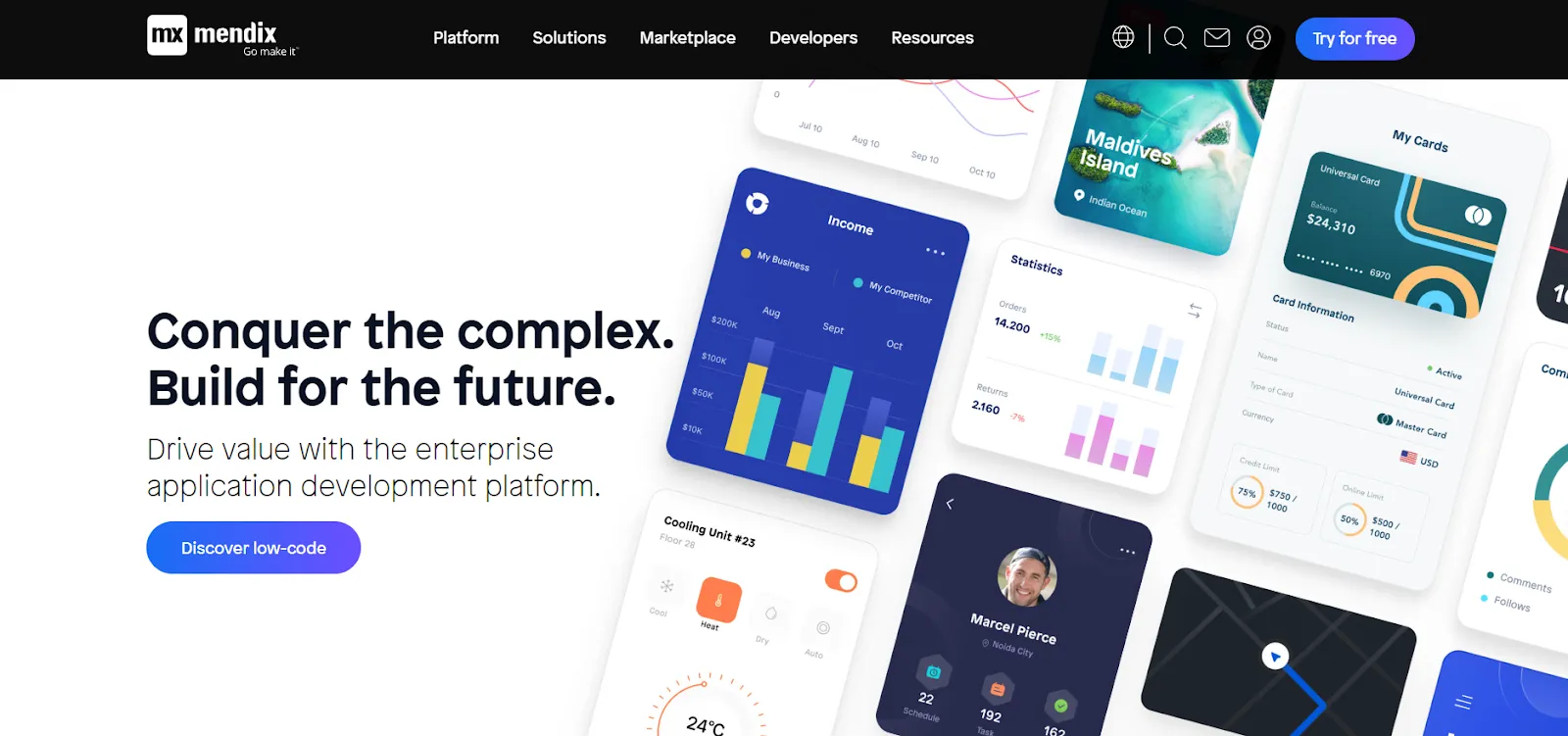
Mendix offers process mechanization through applications that bring systems,
information, and individuals together. Use your creative mind to create apps
that save time for big businesses that assist organizations as expected.
Features:
- It's a low-code stage that anybody can use to work on their business by offering quality apps without including code intricacies.
- You can coordinate rationale and info from any source or framework. It makes your applications extensible and open for various platforms and models.
- You can make applications to serve different businesses, including SAP inventory network processes, high-esteem resource field administration, hardware support, operations, AI savvy banking, and more.
- This low-code application improvement platform will assist you with making better-quality programming via robotizing and abstracting the advancement interaction.
- Enable co-creation in a different range by utilizing devoted IDEs and a specific visual language to meet your business needs.
- You can fabricate a portable, challenging, and versatile application without coding mastery. And afterward, convey it anyplace with a click.
- Mendix offers a few devices for testing, creating, and deploying applications. Mendix utilizes model-driven engineering (MDE), which centers around dynamic demonstrating.
Platform: Windows, Web, Linux, Android, iOS, and Windows phone.
Price: Single App plan: Starts at $1875/month, Pro: Starts at $5375/month,
and Enterprise: Starts at $7825/month, Free Trial Available (The community
version)
6. Outsystem
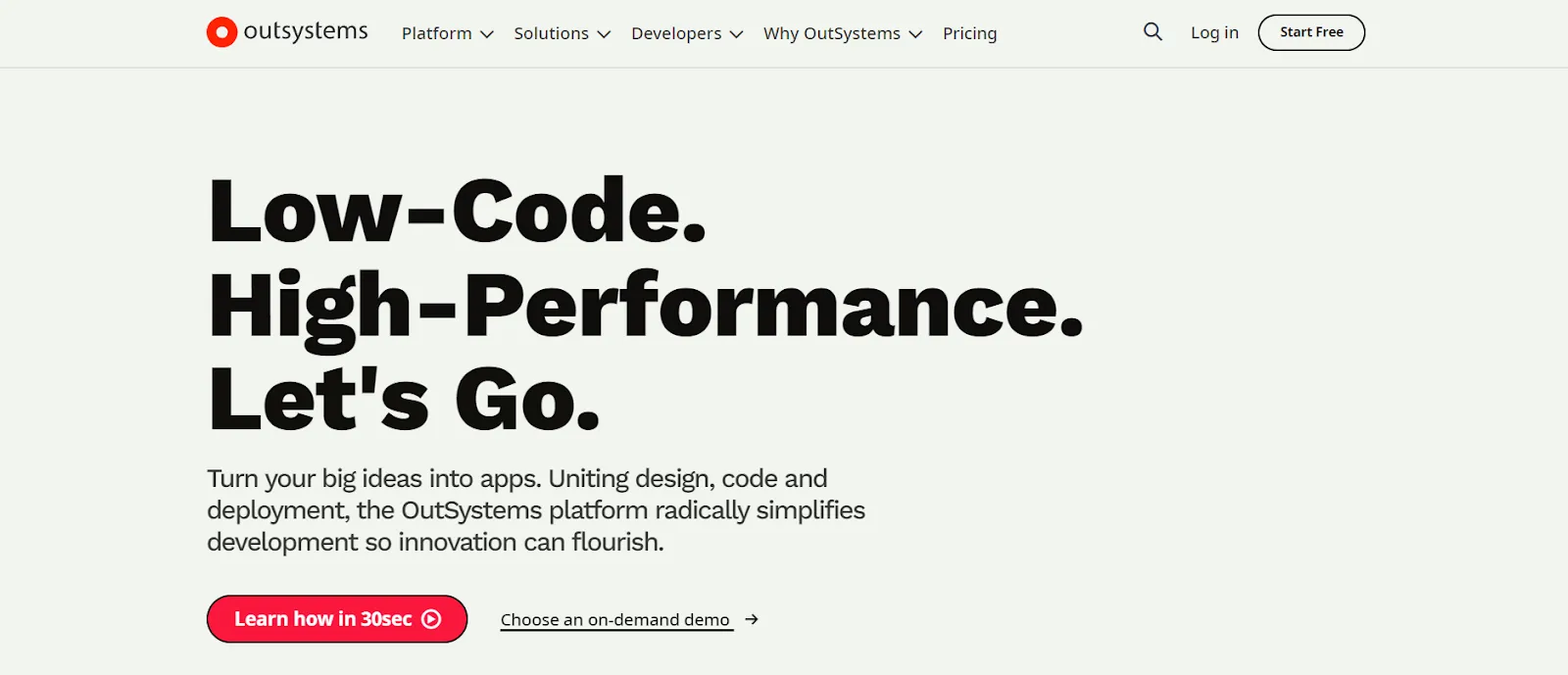
With OutSystems, organizations can make applications for different platforms.
The platform's essential elements incorporate constant execution dashboards
and robust safety measures.
Features:
- It offers many benefits and collaborative tools to deliver secure, adaptable, and robust apps.
- Its fast, versatile application arrangement and monitoring
- Observes and reporting of application use and execution
- It empowers you to make rapid, model-driven developments utilizing the cloud and AI
- Easy to deal with application backlog, updates and convey cloud apps to drive advancement
- It speeds up and rearranges application lifecycle streamlining. It offers the most recent cloud technology and adds new elements and abilities
- Includes a simplified UI, information models for full-stack creation, and cross-stage applications
- You can refresh and deploy applications with a single click. Make your applications higher caliber by using client input and feedback from the applications
- Break down models and refactor conditions utilizing OutSystems. It assists you with building apps with native device/gadget access, on-gadget logic, and offline mode data sync.
Platform: Windows, Web, Mac, Linux, Android, iOS.
Price: The enterprise plan: Starts at $6250/month, and the Universal plan:
Starts at $15000/ month, Free Trial Available
7. Quickbase
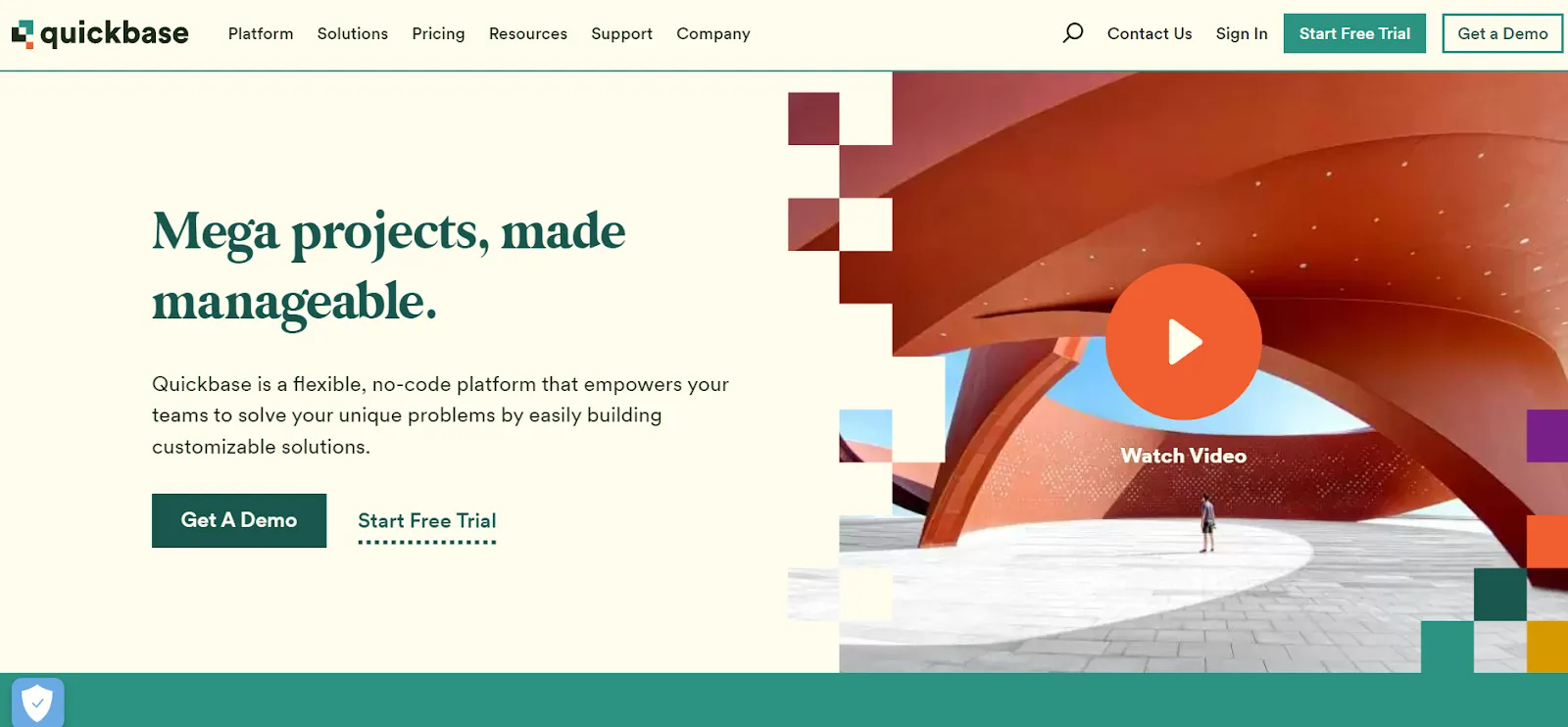
With Quickbase, you can unlock the max capacity of your business activities by
consolidating this platform. We can fabricate top-caliber, result-driven
applications that associate thoughts, data, and individuals everywhere.
Features:
- It speeds up your business processes, so you convey quality applications in fast completion times.
- It ensures data security and integrity and lets you keep control of your business.
- This platform assists you unite your business, IT groups, developers, and engineers so they can advance, sustainable, and secure apps
- It liberates you from the heritage system and gives you a bunch of capacities created to cooperate and work on your apps.
- It tracks every progression made so you can audit, discard, or publish the advances. Try not to stress over administrative consistence and security as Quickbase.
- It has acquired rigid capability confirmations and certificates like HIPAA, DFARS, SOC 1 and 2, and EU-US Privacy Shield.
- You can integrate your applications with services like Slack, DocuSign, Salesforce, Bill.com, Gmail, etc.
- It is the ideal LCDP for one who wishes to make data assortment and storage applications.
- It incorporates cloud-based arrangements like NetSuite, Box, and Gmail through prebuilt application connectors.
- Quickbase includes consent and granular jobs, corporate client the board, and a hearty UI for security.
Platform: Windows, Web, Android, iOS.
Price: Premier plan starts from $25/user/month and the Platform plan at
$40/user/month, Free Trial Available
8. Linx
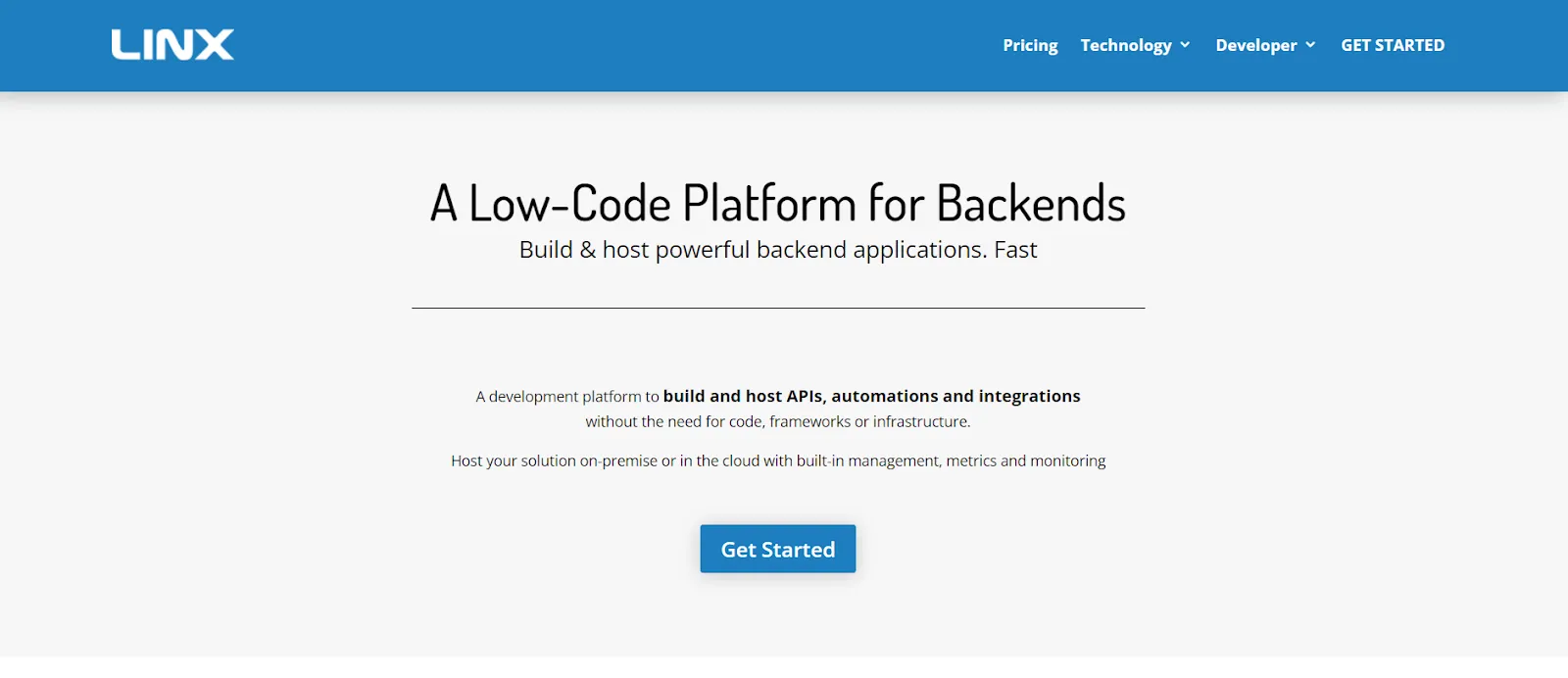
Linx is a development tool for the fast turn of events and back-end
applications like APIs, integration, and robotization.
Features:
- It can Implement your business logic with info from your docs, frameworks, data sets, and APIs.
- A unique plugin architecture diminishes 1000s of lines of code to a solitary visual function with properties.
- It requires no need for information or skill in a particular language or system. We can coordinate with many APIs and services in minutes.
- Its solutions get sent with a single click to servers running in the cloud or on-premise.
- Cut-off checking, monitoring access control, and forming are standard with this platform.
Platform: Windows and Mac
Price: Self-support pack starts from $349/YEAR, Standard $799/YEAR AND
Premium $ 1,299, Free Trial Available
9. Creatio
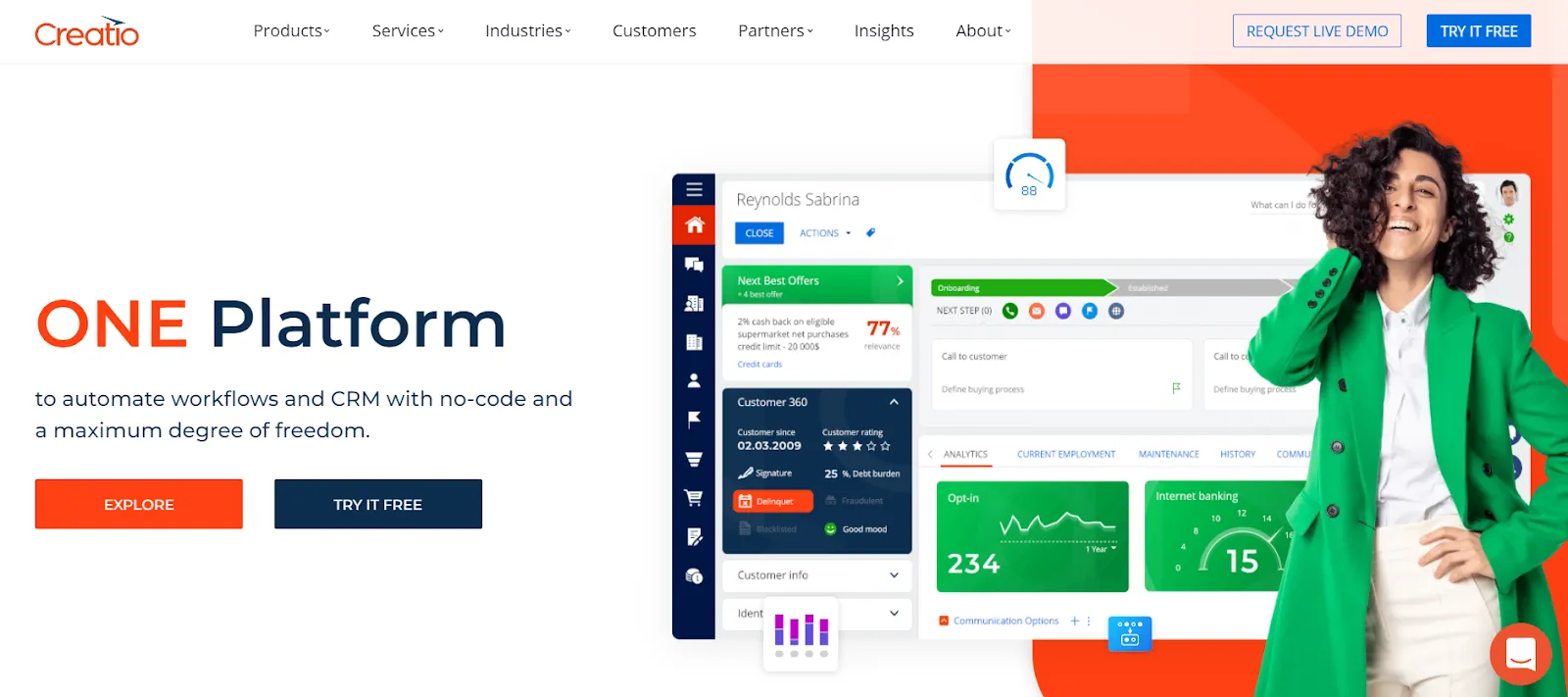
Creatio is a Software as a service (SaaS) low-code platform for process
and customer relationship management( CRM ). It can implement rules,
automate tasks, and third-party integrations.
Features:
- BPM engine to manage structured and unstructured processes
- You can create KPI dashboards, multi-user portals, searchable databases, location-based apps, etc
- It allows you to import or export data using connectors from Caspio to other cloud repositories like FTP, AWS, Dropbox, and more
- Caspio's visual app builder guides you through every aspect of building accurate cloud-based apps
- AI/ Machine learning tools speed up processes, make data-backed decisions, and simplify the analytical work.
- Customize your apps with standard technologies like CSS, HTML, and REST API
- It provides features to streamline customer engagements and speed up service delivery.
- Caspio's deployment model is perfect for both public-facing and internal applications.
- This platform is the best-in-class technology stack on AWS and SQL Server
Platform: Windows, Web, Mac.
Price: Enterprise Edition starts from $25/ user/month, Free Trial
Available
10. Bubble
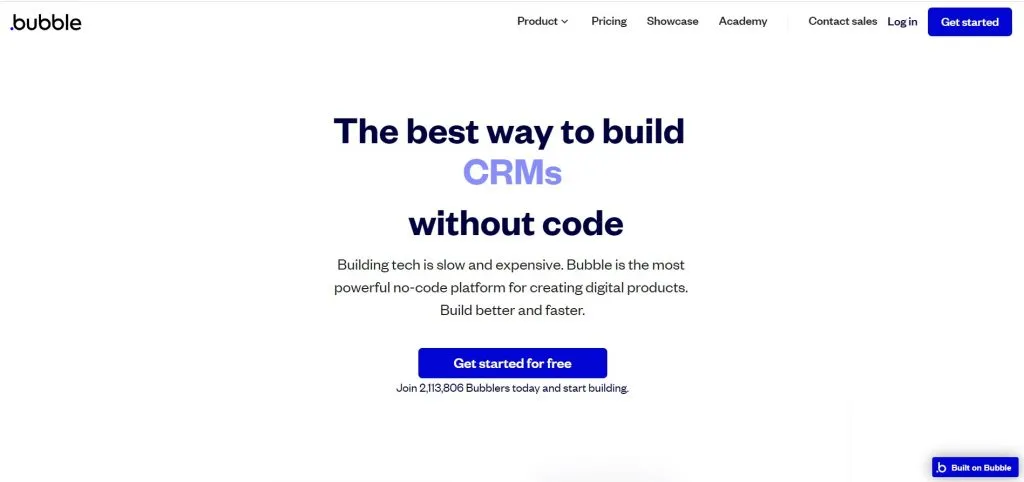
The Bubble can be the quickest method for fostering an application without
composing a single line of code. Moreover, YouTube guarantees to smoothen
the expectation to learn and adapt with this unique platform.
Features:
- It enables non-technical people to build web applications without needing to type code.
- Its simplified connection point gives you incredible command over the design components.
- You can set up the application logic to conclude what occurs on each screen as a client/user navigates inside.
- Bubble keeps things fascinating with its comprehensive library of visual components. It permits secret password safeguarded logins in any OAuth 2.0 viable user verification system like Google and Facebook.
- You have an unlimited opportunity to expand the usefulness with javascript and API combinations.
- The applications you create are adaptable as per your crowd development. You can follow the application use limits, site design changes, and Stripe and Braintree to simplify payment.
- This no-code stage guarantees immaculate cooperation with its entrance-controlled joint effort.
- The Bubbles is a facilitated web application across the board manufacturer. I give unlimited plan opportunities to its users/clients with no code.
- It permits you to make web application designs without having any information on CSS or HTML. Typical web applications expect you to handle the code and set up a sending cycle to a web server.
- Its strong Bubble CMS is also simple to associate with other front-end advancement devices.
Platform: Windows, Android, iOS.
Price: Proficient plan starts from $129 /month, and the Creation plan
starts from $529/month, Free Trial Available
Conclusion
Each low-code or no-code platform mentioned above offers various advantages.
Be that as it may, with so many choices accessible, picking the ideal one for
yourself can be interesting.
Also, it would help if you thought about your business prerequisites before
taking your pick. Be that as it may, aside from a solid low code stage,
fabricating a decent programming arrangement requires a group of good
programmers.
I trust the above info on low-code and no-code platforms will assist you in
figuring out and choosing the best platform per business necessities.
So, don't wait to create your application with these Low-Code/No-Code
platforms.
Thanks!!!
Frequently Asked Questions
Q1. Who can benefit from using low-code and no-code platforms?
Low-code and no-code platforms benefit many users, including business analysts, citizen developers, entrepreneurs, and even experienced developers who want to accelerate the application development process. These platforms enable faster development cycles and empower users with limited technical skills to create applications.
Q2. What are the advantages of using low-code and no-code platforms?
Some key advantages of low-code and no-code platforms include the following:
- Increased productivity and faster time to market.
- Reduced reliance on traditional software development methods. ]
- Empowerment of non-technical users to create their own applications.
- Lower development costs and resource requirements.
- Easier maintenance and updates of applications.
Q3. Are low-code and no-code platforms suitable for complex applications?
Yes, low-code and no-code platforms can be used to develop complex applications. While they may have limitations compared to custom-coded solutions, these platforms often provide advanced features and integrations that allow for the developing of sophisticated applications.
Q4. Can apps built with low-code or no-code platforms integrate with other systems and services?
Low-code and no-code platforms seamlessly integrate with popular APIs, databases, and third-party services. Users can connect their apps to external systems, access real-time data, and unlock a world of possibilities. The result is a robust and interconnected app ecosystem.
Q5. Are there any limitations or drawbacks to using low-code and no-code platforms?
Low-code and no-code platforms offer numerous benefits, but they also have limitations. These can include constraints on customization, scalability, and flexibility compared to custom-coded solutions. Additionally, traditional development methods better serve highly specialized or unique application requirements.
Q6. What about supporting and maintaining apps built with low-code or no-code platforms?
Low code and no code platforms alleviate the burden of app maintenance. They often automatically handle updates, bug fixes, and security patches, enabling users to focus on their app's success. Additionally, vibrant user communities associated with these platforms provide valuable assistance and support.
Q7. Can someone really build an app without any coding knowledge?
Yes! With no code platforms, individuals can build fully functional apps without being coding experts. By leveraging intuitive drag-and-drop interfaces, anyone can construct their dream applications and enjoy the satisfaction of creating something remarkable.
Tags
No-code development
low-code app development

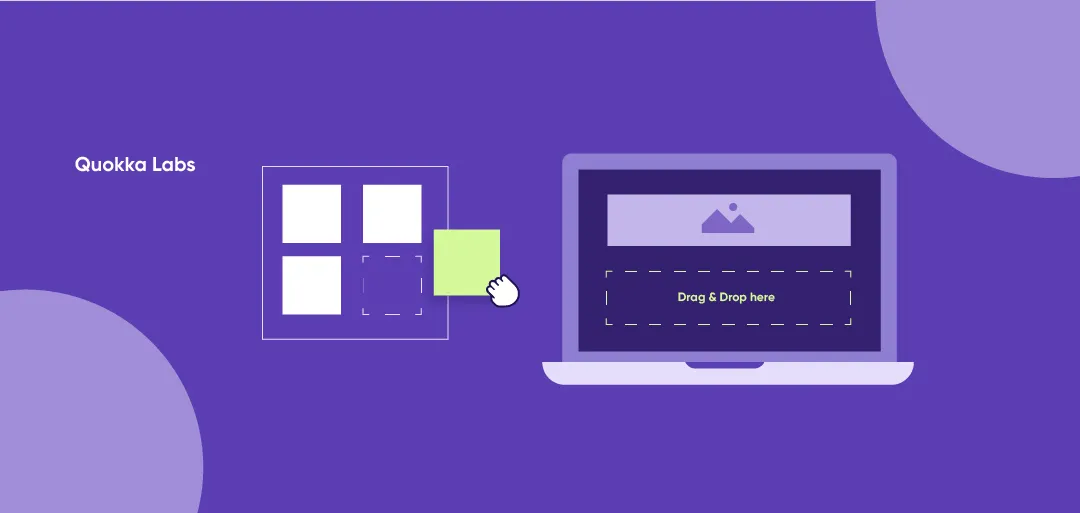

 Facebook
Facebook
 Twitter
Twitter
 LinkedIn
LinkedIn
 Pinterest
Pinterest













